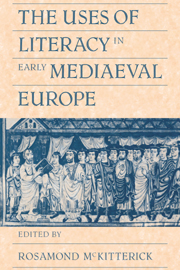Book contents
- Frontmatter
- Contents
- List of illustrations
- Contributors
- Preface
- Abbreviations
- Introduction
- 1 Literacy in Ireland: the evidence of the Patrick dossier in the Book of Armagh
- 2 Anglo-Saxon lay society and the written word
- 3 Administration, law and culture in Merovingian Gaul
- 4 Literacy and the papal government in late antiquity and the early middle ages
- 5 Literacy and the laity in early mediaeval Spain
- 6 Aspects of mediaeval Jewish literacy
- 7 Writing in early mediaeval Byzantium
- 8 Literacy displayed: the use of inscriptions at the monastery of San Vincenzo al Volturno in the early ninth century
- 9 Royal government and the written word in late Anglo-Saxon England
- 10 Literacy in Carolingian government
- 11 Text and image in the Carolingian world
- Conclusion
- Index
4 - Literacy and the papal government in late antiquity and the early middle ages
Published online by Cambridge University Press: 07 December 2009
- Frontmatter
- Contents
- List of illustrations
- Contributors
- Preface
- Abbreviations
- Introduction
- 1 Literacy in Ireland: the evidence of the Patrick dossier in the Book of Armagh
- 2 Anglo-Saxon lay society and the written word
- 3 Administration, law and culture in Merovingian Gaul
- 4 Literacy and the papal government in late antiquity and the early middle ages
- 5 Literacy and the laity in early mediaeval Spain
- 6 Aspects of mediaeval Jewish literacy
- 7 Writing in early mediaeval Byzantium
- 8 Literacy displayed: the use of inscriptions at the monastery of San Vincenzo al Volturno in the early ninth century
- 9 Royal government and the written word in late Anglo-Saxon England
- 10 Literacy in Carolingian government
- 11 Text and image in the Carolingian world
- Conclusion
- Index
Summary
It would be entirely legitimate to investigate many of the roles played by literacy in the story of the rise of the Roman church and of the papal administration. Wilken has seen the dawning of ‘proto-catholic’ tradition as a major stage in the rise of the Roman church, and he identifies the quest to define canon, creed and authority as distinguishing marks of that tradition. The ability to write, to read and to understand texts played a major role in that process. It is true that Rome played a small role in the definition of the scriptural canon – apart perhaps from providing some impetus to the preparation of the Vulgate translation – but the papal role in struggles over creeds and authority was large and long-standing. Early Christianity saw the development of many written rules for living, some of which were ascetic, or monastic, and of little interest in Rome – initially at least – but others of which, embodied in almost countless conciliar enactments, were or became subjects of intense concern at the papal court. Finally, many Christian communities, but none more so than that of Rome, generated abundant records of the routine minutiae of ecclesiastical administration.
Treating the subject of literacy in the papal administration, then, requires a focus that will rest essentially on the kinds of records which that administration produced and conserved. In some instances it is easy to see why certain kinds of records appeared, but in other cases it is more difficult.
- Type
- Chapter
- Information
- The Uses of Literacy in Early Mediaeval Europe , pp. 82 - 108Publisher: Cambridge University PressPrint publication year: 1990
- 3
- Cited by



